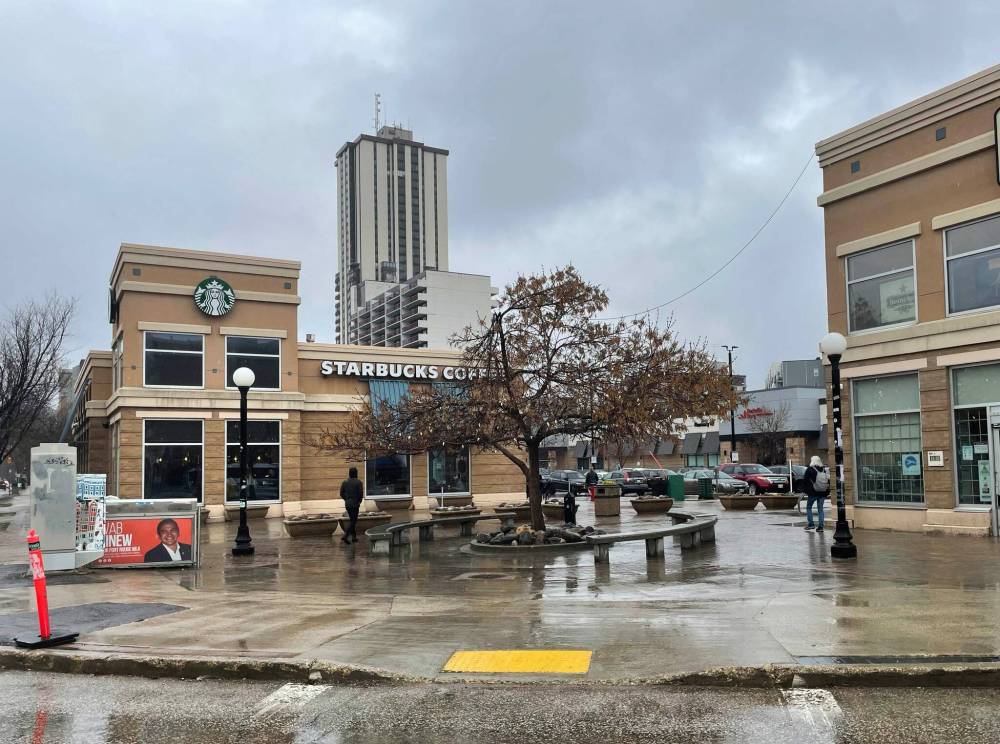Coffee canary in the crime coal mine?
Advertisement
Read this article for free:
or
Already have an account? Log in here »
To continue reading, please subscribe:
Monthly Digital Subscription
$0 for the first 4 weeks*
- Enjoy unlimited reading on winnipegfreepress.com
- Read the E-Edition, our digital replica newspaper
- Access News Break, our award-winning app
- Play interactive puzzles
*No charge for 4 weeks then price increases to the regular rate of $19.00 plus GST every four weeks. Offer available to new and qualified returning subscribers only. Cancel any time.
Monthly Digital Subscription
$4.75/week*
- Enjoy unlimited reading on winnipegfreepress.com
- Read the E-Edition, our digital replica newspaper
- Access News Break, our award-winning app
- Play interactive puzzles
*Billed as $19 plus GST every four weeks. Cancel any time.
To continue reading, please subscribe:
Add Free Press access to your Brandon Sun subscription for only an additional
$1 for the first 4 weeks*
*Your next subscription payment will increase by $1.00 and you will be charged $16.99 plus GST for four weeks. After four weeks, your payment will increase to $23.99 plus GST every four weeks.
Read unlimited articles for free today:
or
Already have an account? Log in here »
Hey there, time traveller!
This article was published 14/06/2024 (542 days ago), so information in it may no longer be current.
There’s something about Starbucks. For many, it’s the place to go to grab a latte and catch up with friends. For others, it’s a great place to study.
The ubiquitous coffee chain first arrived in Canada in 1987 and it’s been both popular and unpopular ever since. Once viewed as the icon of globalization, it has enjoyed years of widespread profits, but has been floundering as of late, particularly in the wake of COVID-19. The announcement earlier this month that it will permanently close its Osborne River location because of safety concerns is troubling.
Is Starbucks the canary in the coal mine in potential trends for businesses?

Ruth Bonneville / Free Press FILES
The Starbucks in Osborne Village is closing permanently over crime concerns.
Starbucks has been credited for creating a “third place” in communities — a place where people can gather that is not work or home.
Coined by the late American sociologist Ray Oldenburg in 2001, third places, which also include beer gardens, pubs and post offices, are the heart of democracy. The former CEO of Starbucks, Howard Schultz was careful to craft an early business model of Starbucks as a place for those to gather and sip coffee, read and chat, replete with comfy chairs and music (often too loud). Starbucks became the place to, as their mission statement suggests, “make a connection.”
Starbucks announced that it was pulling out of one of the most dynamic intersections in the city of Winnipeg permanently, due to safety concerns, earlier this month. In an email, Starbucks’ spokesperson Leanna Rizzi, told CBC in an email that: “There are several factors we consider when evaluating our store portfolio, and the personal safety and security of our partners is of utmost importance to us and is always something we consider when reviewing the experience in our stores.”
Starbucks has been looking to rejigging its business model for some time. In 2020, it announced that it was closing down a number of Starbucks across Canada to focus more on takeout or pickup orders. Last year, the downtown Starbucks on Broadway was shut down because it didn’t have a drive-thru window and relied only on foot traffic. The Corydon Starbucks also suffered a similar fate, but it was quickly replaced by a local coffee roaster undeterred by the lack of a drive-thru window.
But Starbucks has also made the decision to shut down locations that are operating in unsafe conditions in other places. Winnipeg is not the first city. In 2022, 16 stores in a number of American cities were shuttered due to safety concerns.
This is not a new idea for a retail operation either. Target, in the United States, announced it was closing nine stores in four states in 2023 citing a rising cost of violent crime and shoplifting. That announcement was later denounced as a “stunt” when researchers determined that the stores closed had fewer crimes than some that remained open. However, company officials remained adamant, armed with statistics from the National Retail Federation, that violent crimes in retail stores are on the rise.
Newsweek in March of this year published an overview of stores that have had to change their operations in California in the wake of violence, including some 7-Eleven stores in Los Angeles which altered its hours of opening. As well, an iconic Macy’s in San Francisco closed its doors and there was the loss of a Denny’s in Oakland, that had been operating for 54 years.
Mike McIntyre’s brilliant two-part overview on retail crime published in the Free Press last week demonstrates just how dangerous working in retail can be. It also shows how pernicious shoplifting has become. There’s been a 300 per cent increase in crimes that carry violence compared to 2019 and since 2020, the rate of overall shoplifting has tripled year over year.
The Winnipeg Police Service, Manitoba Justice and those dealing with addictions and poverty are well aware of the difficulties finding short- or long-term solutions to a problem that is like a hydra.
Address the issue of addictions and open more rehabilitation centres. Address poverty and provide easier access to education and employment training for meaningful jobs. Go after the crime bosses and address organized crime. Create a shift in thinking that shoplifting is victimless (it’s costing consumers as much as $5-billion annually). It’s a long list.
But that list needs to be attended to and soon. Or the Starbucks closing at Osborne won’t be a one-off. It will become the go-to response.
Shannon Sampert is a lecturer at RRC Polytech. She was the politics and perspectives editor at the Free Press from 2014-17.






